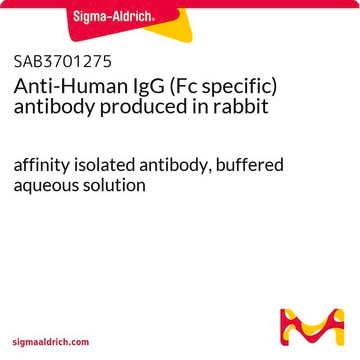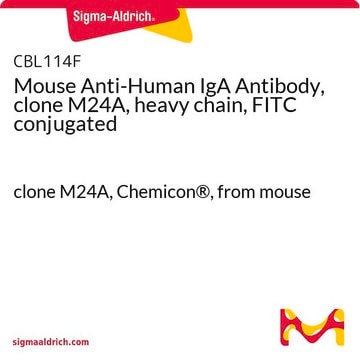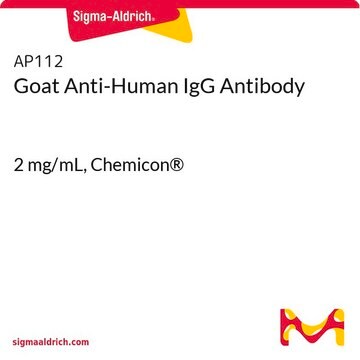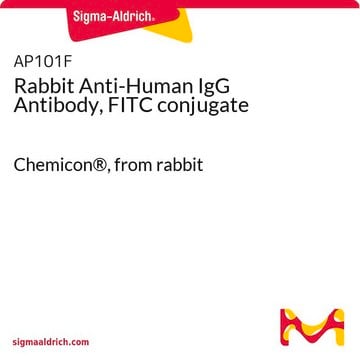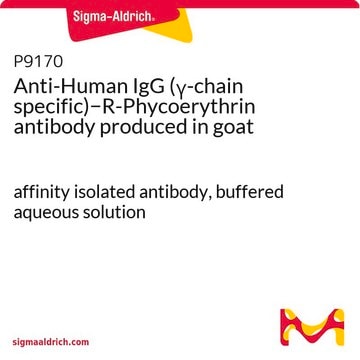AP112F
Goat Anti-Human IgG Antibody, FITC conjugate
Chemicon®, from goat
Sign Into View Organizational & Contract Pricing
All Photos(1)
About This Item
UNSPSC Code:
12352203
eCl@ss:
32160702
NACRES:
NA.46
Recommended Products
biological source
goat
Quality Level
conjugate
FITC conjugate
antibody form
affinity purified immunoglobulin
antibody product type
secondary antibodies
clone
polyclonal
species reactivity
human
manufacturer/tradename
Chemicon®
technique(s)
immunofluorescence: suitable
shipped in
wet ice
target post-translational modification
unmodified
Related Categories
General description
FITC-conjugated Affinity Purified Goat anti-Human IgG (H+L)
Specificity
Human IgG (H&L)
Immunogen
Purified human IgG.
Application
Goat anti-Human IgG Antibody, FITC conjugate is an antibody against Human IgG for use in IF.
Immunohistochemistry: 1:200-1:2000.
Optimal working dilutions must be determined by end user.
DILUTION:
Suggested dilution for most applications: 1:50-1:200
Optimal working dilutions must be determined by the end user.
Optimal working dilutions must be determined by end user.
DILUTION:
Suggested dilution for most applications: 1:50-1:200
Optimal working dilutions must be determined by the end user.
Research Category
Secondary & Control Antibodies
Secondary & Control Antibodies
Research Sub Category
Whole Immunoglobulin Secondary Antibodies
Whole Immunoglobulin Secondary Antibodies
Physical form
ImmunoAffinity Purified
Lyophilized from 0.02 M phosphate buffered saline, 0.25 M sodium chloride, pH 7.6, with 0.1% sodium azide and 15 mg/mL bovine serum albumin.
Reconstitute with 2 mL of sterile distilled water.
FLUOROPHORE/PROTEIN:
Approximately 14μg/mg
Reconstitute with 2 mL of sterile distilled water.
FLUOROPHORE/PROTEIN:
Approximately 14μg/mg
Storage and Stability
Maintain lyophilized product at 2-8°C for up to 12 months. After reconstitution the product is stable for several weeks at 2-8°C as an undiluted liquid. For extended storage after reconstitution, add an equal volume of glycerol to make a final concentration of 50% glycerol followed by storage at -20°C in undiluted aliquots for up to 12 months. Please note the concentration of protein (and buffer salts) will decrease to one-half of the original after the addition of glycerol. Avoid repeated freeze/thaw cycles.
WARNING:
For research use only; not for use as a diagnostic.
WARNING:
For research use only; not for use as a diagnostic.
Legal Information
CHEMICON is a registered trademark of Merck KGaA, Darmstadt, Germany
Disclaimer
Unless otherwise stated in our catalog or other company documentation accompanying the product(s), our products are intended for research use only and are not to be used for any other purpose, which includes but is not limited to, unauthorized commercial uses, in vitro diagnostic uses, ex vivo or in vivo therapeutic uses or any type of consumption or application to humans or animals.
Not finding the right product?
Try our Product Selector Tool.
Signal Word
Warning
Hazard Statements
Precautionary Statements
Hazard Classifications
Acute Tox. 4 Dermal - Acute Tox. 4 Inhalation - Aquatic Chronic 3
Storage Class Code
11 - Combustible Solids
WGK
WGK 3
Certificates of Analysis (COA)
Search for Certificates of Analysis (COA) by entering the products Lot/Batch Number. Lot and Batch Numbers can be found on a product’s label following the words ‘Lot’ or ‘Batch’.
Already Own This Product?
Find documentation for the products that you have recently purchased in the Document Library.
S Mu et al.
Transfusion medicine (Oxford, England), 29(2), 121-127 (2018-03-07)
The aim of this study was to characterise a novel mutation in the gene encoding RhAG in order to elucidate a molecular mechanism for Rh antigen expression and spherocytosis. Rhesus-associated glycoprotein (RhAG) is critical for maintaining the structure and stability
Our team of scientists has experience in all areas of research including Life Science, Material Science, Chemical Synthesis, Chromatography, Analytical and many others.
Contact Technical Service
